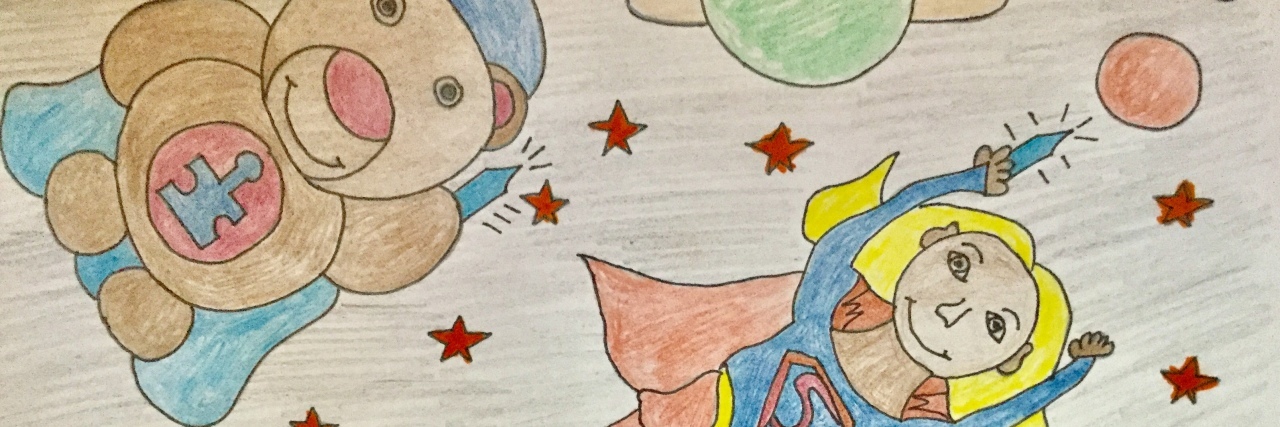Somewhere in a galaxy far, far away, a Kryptonian alien seeks safe-haven on Earth as her home planet was destroyed. As time goes by, her adoptive family raises her and she becomes a hero in National City. Her name is Supergirl.
A natural born human came to Earth, but his mind acts like an alien. He has seen Supergirl flying up in the sky and thinks to himself, “she also faces many challenges” — just like himself. This is the tale of two aliens. This is how the CW hit series “Supergirl” is relatable to me.
As the show expands over its first three seasons, “Supergirl” starts to become socially conscious with layers of subtext being explored. On the first season, the show explored Kara’s heroic journey; the second season explored LGBT themes; the third season explored Kara’s conflict between her alien and human lives. I think alien can be a strong metaphor for disabilities. Alien represent differences in how we think or how we live. Both Kara and I face obstacles when we try to understand how the world functions.
Kara began her journey by becoming National City’s savior, protecting her people from dangerous threats such as criminals, extraterrestrials and androids. She’s very kind, but when people try to put her down, she can be both stubborn and short-tempered. For example, after she saved a bunch of school kids from two reckless drivers, Kara bluntly broke one of the driver’s hands. When Kara’s boss Cat Grant called out her name many times, Cat became very annoyed and looked down on Kara. Abruptly, Kara unleashed her anger on Cat. She’s never afraid to tackle her dangerous enemies like General Zod, Queen Rhea and Reign. Kara is a fierce protector and cares so much for her friends and family, no matter what.
I am human, but my mind is “alien-ish.” I’m an alien in my own world. I’m a sensitive person and get easily intimidated by people who are very strict. I’m a person still stuck in my own bubble. I am the star of my own journey, though my journey is more of an internal struggle. I’m dealing with my disability, Asperger’s syndrome. Everyone around me doesn’t care what I do. I learn how to take control of my own life and my own happiness. I don’t have anger issues, but I deal with situational anxiety. When there’s an abrupt, unexpected change in my routine, I get nervous about what’s going to happen. People with Asperger’s sometimes struggle when we need to get used to changes.
Kara and I try to understand what makes sense and what doesn’t make sense. We see the world differently. There were four episodes that were especially relatable to me: “Red Faced,” “Girl of Steel,” “Both Sides Now,” and “Not Kansas.” In “Red Faced,” Kara’s having trouble harnessing her anger. Two of her friends tell her to reach out if there’s something bothering her. I get upset too if I can’t get something I want. My parents tell me not to get upset because there’s always a next time.
In “Girl of Steel,” Kara had gone through a break-up and was beginning to shut herself off from her friends. She keeps all of her emotions in a bottle — lost and confused. Alex, Kara’s adoptive sister, encourages Kara to let her emotions out, but things get heated as Kara angrily says: “Kara Danvers sucks right now! Supergirl is great. Supergirl saves the world. So, if I could choose to be her, why would I ever choose to be the sad girl who’s boyfriend is gone? …I am not a human, I tried to be but I’m not.” Kara’s soul is wandering around in circles, lost and directionless. When people told me “work harder,” “you are too nice,” or “push yourself,” I was about to give up my niceness. I listen to people’s advice too much and I got more confused and upset.
In “Both Sides Now,” Kara discovered a worldkiller named Purity. When Kara met Purity, she looked innocent and went by the name Julia Freeman. It turned out Julia was possessed by the Purity entity. Kara decided not to kill them both as she showed compassion for them, but Alex was skeptical and interrogative. Alex warned Kara that Purity needed to be killed and Kara couldn’t be naive because Purity was dangerous. Kara was in a conflict between compassion and morality. This reminds me of one time when my dad was about to drop me off at a volunteer event and we came upon a security guard who seemed not easygoing. I wouldn’t say the guard was mean (as I don’t know that person’s story) but maybe he was in a bad mood. My dad picked me up. I said to my dad, “maybe the guard’s having a bad day or maybe the guard is sad.” Here’s when the conversation got interesting. My dad said, “…but still, it’s not an excuse to do that. In order to gain respect, you need to treat people the way you want to be treated.” Alex and my dad know what’s moral, but Kara and I have naive judgement.
In “Not Kansas,” Kara feels like she doesn’t belong to Earth. She wants to give up her heroism and exchange it for a normal life as a “normal person.” Sometimes, I want to exchange my disability for being a regular person or to be normal. If I did not have autism, I believe I would be able to think much clearer and do a lot of things like climbing rocks, writing books and making movies.
For these two aliens, their stories are only the beginning. There will always be challenges for them, every single day. Whenever a new chapter unfolds, adventure awaits for them. No matter how different they are and no matter where they come from, the world needs different kinds of minds. Both of these aliens are meant to be.

